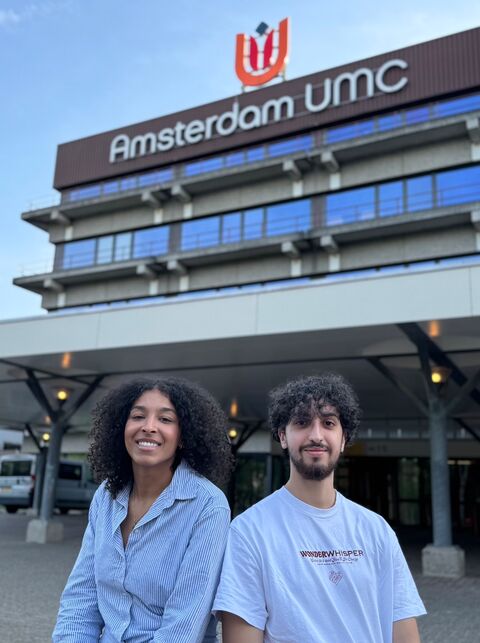
Two new Student Diversity Officers at the Faculty of Medicine
Two new Student Diversity Officers at the Faculty of Medicine
Why did you want to become a Student Diversity Officer?
"In the role of Student Diversity Officer, I am a voice for students and can be critical of the programme and its content. That combination appeals to me," replies Myriam. "I think it is important that students feel safe and welcome at our faculty. Now I have the chance to work on this." Anass continues: "A friend saw the vacancy first and thought it was something for me. I was immediately excited. There are many great initiatives within the faculty, but implementation is not always ideal. In the role of Student Diversity Officer, I can now make an impact myself."
"We want to remove barriers and tackle clichés."
What does a Student Diversity Officer do?

“As Student Diversity Officers, we are the link between students, the faculty, and Amsterdam UMC,” says Myriam. “I want to understand how students experience diversity and inclusivity. If students from certain religious or ethnic backgrounds experience barriers, I want to address that. The same applies for students with disabilities.” Anass agrees: “I want to play a good communication role between all stakeholders and, above all, do something with what students want. I look forward to coming up with initiatives that promote diversity and inclusion.”
How are we doing at the Faculty of Medicine?
“Things have certainly improved in terms of diversity within the programme, but action is not always taken,” finds Myriam. “Not everyone is aware of the assumptions that are made. In lecture halls, people often work from standards that do not appeal to students from other backgrounds. For example, the white man is often portrayed as the specialist or the surgeon. We really need to tackle these clichés within medical education. More attention should also be given to diversity in teaching materials.” Anass adds, “Fortunately, we are moving in the right direction, but there is still much to improve. Take teaching materials, for instance. It mainly contains pictures of skin disorders on a light skin, whereas you should also learn to recognise them on a dark skin. This has been discussed for a while, but images of dark skin types have not yet been implemented into all the teaching materials. I heard an anecdote that the Kruidvat takes skin colour more into account than a Medical education programme. We really need to do something with that.”
For what can students approach you?
“We want to be easily approachable. In the coming period, we will expand our network by proactively reaching out to people. We hope that others will find us more easily as well,” says Anass. “Yes!” continues Myriam, “And you really don’t need to have a big problem to talk to us. We’re happy to get to know you and we're always open for a nice chat and a cup of coffee.”
Questions?
Do you have questions for Myriam or Anass or would you like to drink a coffee with them? Then mail to sdo@amsterdamumc.nl.